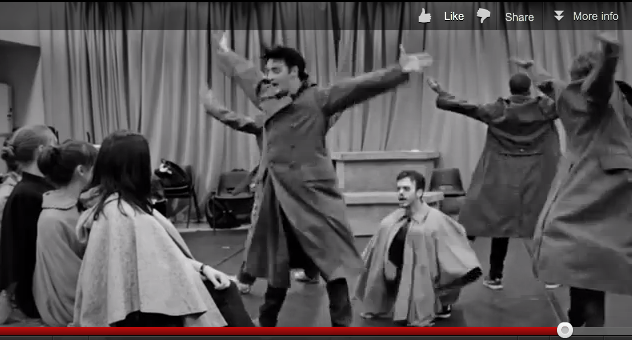Watching a play on YouTube isn’t the same as seeing it in a theatre. On the one hand, you have to fight the urge to fast-forward, even if you’re engaged in the performances; the next scene is just a click away. Your screen is filled with icons and temptations, and the play’s dialogue can be interrupted by email chimes.
On the other hand, you’re seeing the play, a play you might not have gotten out of your house to see, or maybe one you couldn’t get a ticket to.
Last Saturday at the Wilshire Ebell Theatre in Los Angeles, a starry cast read Dustin Lance Black’s courtroom drama 8, about the federal court trial of California’s same-sex marriage rights-banning Proposition 8. The house was full of celebrities and thought-leaders. The performers, whose names I won’t enumerate here because they were too many and everyone was so good, gave impassioned portrayals, script-binders in hand.
The YouTube video now has close to half a million views, and may reach 1 million. To put that in perspective: If a specialty movie gets that many ticket-buyers, it will be in the top 20 of the year.
You can watch it here:
This production of 8 isn’t repeatable, because you’d never get that cast together again, nor would a theatre take it on, because the cast is simply too large; the play’s too expensive to produce.
But it doesn’t make the play impossible to stage. Part of the strategy with 8 is to incite other readings in other parts of the country. Dozens have been scheduled already: you can track them online.
It brings to mind the WPA Federal Theatre’s bold move in 1936, when they opened Sinclair Lewis’ anti-fascist play, It Can’t Happen Here, simultaneously at 21 theaters in 17 states.
My advice to theatres: put your work where people can easily see it, and they’ll get engaged. Eventually they’ll come to the theatre and buy tickets. Damian Cruden, artistic director at the UK’s York Theatre Royal does just this. YTR shares a full range of videos, even of rehearsals, to keep their audience community updated.
Purists will say, of course, that the video isn’t the play. They’re right. It doesn’t pretend to be. It is a tool, one among many, that builds awareness shares work with audience and community.
Theatre financiers will complain that having a readily-accessible free video will cannibalize ticket sales. They’d be wrong, and I have some experience in this area, from my own theatre days. When Robert Altman’s film of Donald Freed’s play Secret Honor, starring Philip Baker Hall, opened, we were still running the play off-off-Broadway, also starring Philip Baker Hall. The movie opened; theatre ticket sales went up.
In all creative work, familiarity doesn’t breed contempt: it breeds temptation.

